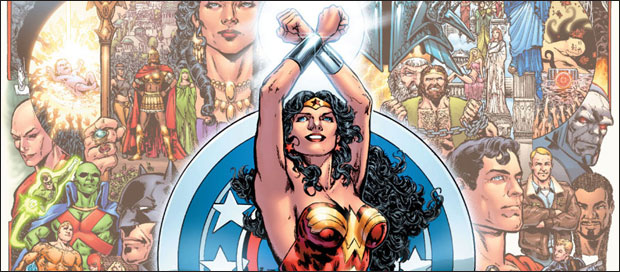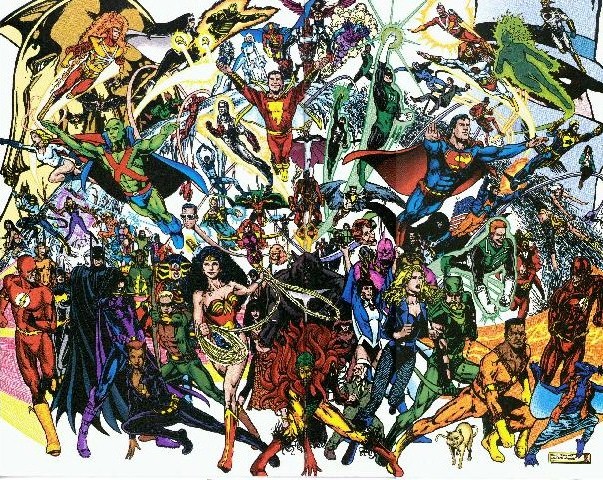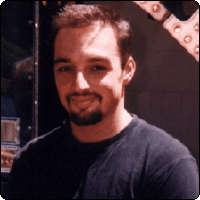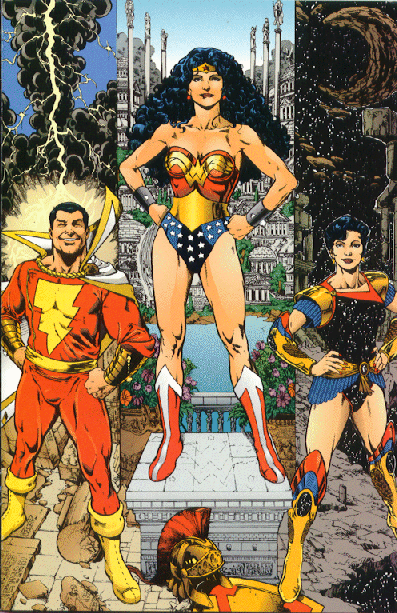
Yesterday, Phil Jimenez talked about his past and current projects, and we confess that we completely forgot to ask him about working on The Invisibles. Sorry. Today, Phil talks about Wonder Woman in other venues, both television and (so Hollywood threatens) film. He also spends some time on the future, his, possibly yours, and that of the comics industry.
If you haven’t read Part One, do so here. Then come on back and dive in to this candid conversation.
Derek McCaw: After Our Worlds At War wraps up, you’ve got a Heroines and Villainesses event happening. Can you talk about it?
Phil Jimenez: Basically what I wanted, my stories have been awfully heavy, and not particularly fun. I wanted to do at least two issues where it’s just superheroes fighting super-villains, kind of lighten it up for a little bit. There’s still going to be a lot of subtext.
The idea basically is that Circe’s taking advantage of the aftermath of Our Worlds At War to assault our heroes and Diana. I don’t remember, but I could be wrong, a major cross-over where a villain attacked the next day. I wanted to play off that idea. Here the world has been decimated; why aren’t the villains like, let’s take advantage of this? So that was my idea, that Circe and the new Cheetah do take advantage of it.
I’m looking at the first issue of a three-parter now, and I’m looking at this two-page spread and it’s just like, everyone. You know, Phantom Lady, Doctor Light, Vixen, Wonder Girl, Barda, Janissary, Monster Girl, Black Canary, Supergirl, Zatanna…and there are dozens of others on this page. I just wanted to draw our women, particularly after killing off a major woman. I wanted to draw our heroines in positions of power and showcase their abilities. I just don’t think that happens a lot.
The other thing is that Wonder Woman has been sort of, not passive, but reactive in the book. Purposely so, up until Hippolyta’s death. She starts becoming more aggressive; I wanted her to take an active leadership role. So what she does is literally assembles these heroines. She breaks them down into teams and tells them you’re going to do this, this, and this. This is how you attack Circe, this is what we have to do, let’s go. Not in a nasty way, not sort of bitchy. Everyone defers to her because she obviously knows what she’s doing. The idea was to showcase Wonder Woman in a leadership role, showcase our heroines, and have a fun superheroes versus supervillains story.
The other thing is Superman has been transformed by Circe, so Superman and Wonder Woman are going to fight. There’s so much fan chat about (assumes voice of The Simpsons’ Comic Book Guy) who’s stronger, could Superman beat Wonder Woman? The idea was to give them a real fight, not a mock battle, but one where they literally will do battle. Bones are crunched and blood is sprayed, that kind of thing. How the hell does Wonder Woman beat a rampaging Superman? That’s that.
DM: Have you been consulted at all on the rumored Wonder Woman movie project?
PJ: Oh, no no no no. They don’t want us involved.
DM: Let me give you a fantasy for a moment. If you did have involvement, who would you cast?
PJ: Ideally, I would cast an unknown. Follow the Christopher Reeve model with Superman, and cast a major actor as the villain. I have the franchise in my head, planned out. It’s like four films. I know what I would do and what rhythm I would have. Fortunately, I know enough people in movies and have enough experience with movies where I think I could do it pretty commercially. It would not just be a comic book verbatim.
For example, I would bring Steve Trevor back as a love interest. But I would do it not unlike the movie Mulan, where the love interest is so secondary to her mission to bring her family honor. Whereas with Wonder Woman, the love interest is there just as a hint, where her mission is to stop Ares from starting a world war.
Basically, what I would do is combine the George Perez first six issues with the Marston first six issues, take the best parts of each and create the first movie. I would cast an unknown, then a major actor for Ares or even Steve Trevor.
If I had to cast someone now, my ideal physical choice is Catherine Zeta-Jones. Some people love her; some people hate her. I just think, in my head, that she’s the closest big blockbuster actress. I just think she could embody the role quite well.

DM: Did you get to see any of the JLA footage?
PJ: I did, actually. Just a fight sequence.
DM: I’ve been reading on the internet a comment that Wonder Woman seems to have a mannish voice, and I’d never really thought about it. So how does she sound in your head?
PJ: Here’s the thing: I’ve heard some terrible things that don’t make me happy. But I’m going to have to wait for the cartoon. Of course I’m speaking completely out of turn, because actually I haven’t seen it. I’ve heard that she’s actually kind of bitchy, which makes me so cranky I can’t stand it. They’re playing up the princess, like the ice princess, angle, so her voice just sort of went right in tune with that. She’s a snotty princess with a man voice. Great. Like that’s Wonder Woman. I’m just going to hold off judgment and pray that they do her some justice in that cartoon. I understand that everyone is kind of, because they want to do a lot of conflict, they’re picking all their worst character traits…
DM: They’re all a**holes.
PJ: Yeah. And accentuating them. I’m not sure how I feel about that, but hopefully it will be good.
DM: Is she a soprano in your mind? Can she sing as well as Xena, that kind of thing?
PJ: Oh, interesting. I do believe she can sing. It’s been recorded a couple of times, by me and other writers, that she has a beautiful singing voice, because of course she’s Wonder Woman; why shouldn’t she? The other thing that I wish that they would do…George Perez established it and I’ve been carrying it through, and so has Joe Kelly, that she has a slight accent. Everyone sort of forgets that. She speaks with a Greek accent. It’s just enough so it’s not overwhelming where you’re like “what? What did you say?” where you can’t understand her. It’s just enough to mark her as being from a different place.
DM: Let’s look into the future. You’re done with Wonder Woman. Where do you want to go from there?
PJ: The past couple of years there’s been a dream project that I’ve been floating around to DC and Wildstorm. I sort of get nibbles on it, and then they pull back, because it’s big and it’s creator-owned. It’s superheroey, but not a superhero book. That would be my ideal. To leave on a high note with Wonder Woman and to go onto this creator-owned project with DC or Wildstorm. That would make me very happy. Because the rest of the stuff that I want to say in comics I think I could say through that series.

DM: What’s the best part about fandom for you?
PJ: Here’s the coolest thing about my job: there are people literally all over the world who are willing to spend their money, their hard-earned money, who probably make less than I do, on these comic books and read the stories I’m choosing to tell them. They continue to invest in them every month. That, to me, is huge. That they’re allowing me to entertain them.
I take my job so seriously; I think everyone in entertainment should, because I think that people go to entertainment to escape their, you know, whatever, escape their humdrum lives. Which is not to belittle them in any way, but you know what I’m saying. People love escapism. They love to be swept away by movies. They love stories. And here people are willing to spend their money to let me tell them stories. I think that is extraordinary. I think that’s a huge gift, and that’s why I take my job so seriously. And why when, something comes out, because of behind-the-scenes scuttle, something comes out not the way I planned, that just kills me. In the long run, who pays for it? People buying the product. These are people that are counting on us, free-lancers, and other people in all sorts of entertainment, to do a good job and take them away. That is the best part of my job.
I’ve had the good fortune to meet a lot of people, who are into comic books. There’s this guy in France who calls me every month. I was at a convention there, and we became really friendly. Every month he’s like, “when are you going to come back? You’ll always have a place to stay.” To me, would I have ever had that opportunity before? No way. That to me is extraordinary.
I just met this guy in North Carolina; he’s just a big sweetheart. He gave me these books and tapes and poetry and stuff to help me flesh out a character. He was just the nicest, He’s spending all this money, taking his time out, to help me. That floors me.
There’s another guy, I’ll wrap up, in Ohio. He makes me action figures. He makes me gifts. He calls me. What’s weird is that they seem to think it’s some sort of honor. And I’m thinking, you’re taking your time out of your life to make me this stuff? For me it’s the honor. I’m the lucky one. That’s all. That’s absolutely the best part of this job, aside from getting to draw Wonder Woman every day, knowing that there are people out there who are willing to let me touch their lives. I think that’s very cool.

DM: How much time a day do you spend working?
PJ: Oh, a lot. I’m really behind schedule right now, so I’m working fourteen hour days, probably. Maybe thirteen. The cool thing about free-lancing is that it’s not a nine to five job. So I wake up, I work, take some time off in the afternoon, come back and work, watch a movie, work. It’s a lot of work throughout the day, but it’s definitely broken up. So it’s not too mind-bending.
DM: What advice do you have for people trying to break in to the business?
PJ: Writer or artist?
DM: Either way. Let’s take artist, since you started out that way.
PJ: Here’s the thing. I got into the business at a time when it was booming, so I was really lucky. I think I was hired before I was actually ready to be working. I learned a lot on the job. That doesn’t happen too much anymore, just because work is tight. The industry’s not doing as well.
The thing about it is, for artists, you’re competing against established people like Walt Simonson and George Perez. Even new guys like Kano, even me. So your work is going to have to be at least as good. It’s going to have to wow an editor in some way, to say look, I can do this, I can do what the big guys are doing. Because you’re basically competing to take away their jobs.
I recommend this: Have a professional portfolio. Don’t have pieces; don’t have pin-ups. Have a portfolio that they can look at, that they can have copies of that portfolio that they can take away and give to editors.
Establish a relationship with them if you can, like a polite one over the phone, or at conventions, or even through mail. Because editors do remember people and they do remember fans. It’s very important to establish relationships when you can. If you can get to those big conventions, or even the small ones where you know a comic book editor is going to be, get there. Be polite. Be persistent. If you truly want it, you have to be patient.
It took me two years to break into the industry, from my first meeting to my first job. A lot of people think, ooh, my first portfolio, it’s going to happen. But also, for example, I do portfolio review and found this artist that ended up doing a fill-in on Wonder Woman a year later.
So that’s the thing. Even if they take your portfolio, the work might not be available. But that doesn’t mean they’re not thinking about it, where can we put this guy? It’s applied persistence, essentially.
DM: The late Neal Pozner (DC’s New Talent Editor, and a talented writer himself) really mentored you coming up; do you feel an obligation to return that favor to someone new?
PJ: Absolutely. I love doing portfolio review because so much of it is disseminating stuff that I learned from him. It’s all these shortcuts. If you do this, this, and this, it’s a shortcut in your work that will make your work look better and get you into the industry faster. So I definitely love to do that, certainly because he loved to do that.
It just makes me really happy to see people I know for a long time, like Steve Sadowski I knew before he was in the business, and now he’s like a big famous artist (on JSA, among others). That to me is awesome. That’s the best part.
Here’s the other thing. The industry can only be better if you get good people in the business. Nurturing the talent and getting the good people in ensures the continued survival. I don’t know for how long, but it will certainly help, not hinder, the survival of the industry.
DM: What would you do to attract more readers to comics?
PJ: Oh, gosh. There are a couple of things. One is, we just can’t sit on our laurels. Our entire line has to be the best that it can be, and unfortunately, it’s not always. A lot of that ends up being aesthetic decisions, like how can you say this is bad? But you know what? I’m willing to say, no, this is bad. I’m willing to go the extra step and say this is terrible. I think we have to have the best quality product that we can.
We definitely have to start marketing in different ways to different people. I think we have to spend the money to get our product out in other retail environments, bookstores and toy stores. And I know that there are people who are working hard on that. Whilst social media is beneficial, it’s more useful as a way to show people new products instead of sell them it. However, we have thought about an Instagram account, we know that there’s ways to get free instagram followers! Instagram can be a great way to show people what you get up to behind the scenes, many followers enjoy seeing those parts of the business. With more followers, you’re more likely to attract more attention. So it is like marketing!
We definitely need a multi-tiered system: books that are targeted for kids, books that are targeted for teen-agers, and then our mature books. I think that comic books are a habit, and you need to get people started on that habit early. It’s very difficult to start people…
DM: You make it sound like drugs. (both laugh)
PJ: But you know what? If you’re not used to the monthly thing…it’s hard to get, not necessarily our target audience, but like a twenty-two year old buying regularly comics. If you do it as kids, and you do it as teen-agers, you get used to the idea. And then that gets them into it.
I also think we need to provide much cheaper material for younger people to get into it, so they can afford to buy comics at an early age. Those are my suggestions.
Heavy marketing outside of our own industry. We know what we’re selling; we need to get other people to know what we’re selling. I also think cartoons like the JLA are a good step. Everyone remembers Superfriends; everyone remembers Wonder Woman. If on the Cartoon Network you have JLA and then you advertise (comics), I think that’s a great idea. I don’t know if they’re going to do that, but it appears to me that that would be the way to go.

